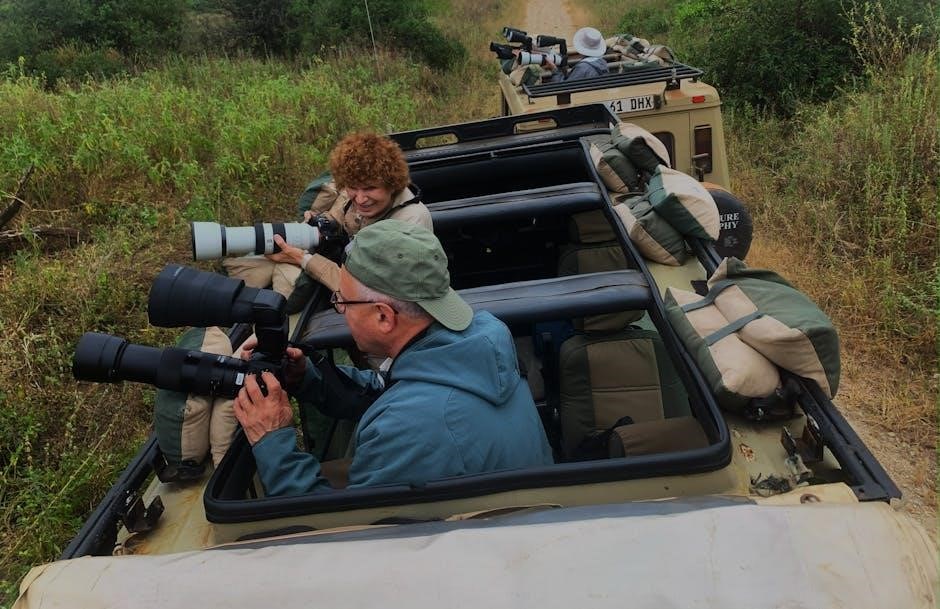A safari tour guide is an expert who leads travelers through wildlife adventures, providing insights into ecosystems, ensuring safety, and enhancing the overall safari experience․
What is a Safari Tour Guide?
A safari tour guide is an experienced professional who leads travelers through wildlife expeditions, ensuring safety and enriching the experience with expertise in local ecosystems, animal behavior, and cultural insights․ Guides are skilled in navigation, wildlife tracking, and conservation knowledge, making them indispensable for a memorable and educational safari adventure․
Types of Safaris: African, Asian, and South American
African safaris offer iconic wildlife experiences in destinations like the Serengeti․ Asian safaris explore diverse ecosystems in countries like India and Sri Lanka․ South American safaris showcase unique species in the Amazon and Pantanal․ Each region provides distinct cultural and wildlife encounters, guided by experts knowledgeable in local flora and fauna, ensuring unforgettable adventures․
Preparing for a Safari
Embark on an unforgettable adventure by ensuring proper preparation, including research, packing essentials, and understanding safety guidelines to make your safari experience both enjoyable and memorable․
Packing Essentials: Clothing, Gear, and Accessories
When preparing for a safari, pack lightweight, neutral-colored clothing, sturdy footwear, and layers for varying temperatures․ Don’t forget essentials like binoculars, a camera, sunscreen, insect repellent, and a reusable water bottle for a comfortable and enjoyable experience․
- Clothing: breathable fabrics, moisture-wicking materials, and a hat․
- Accessories: sunglasses, a first-aid kit, and a portable charger․
Health and Safety Tips for Safari Travelers
Ensure vaccinations are up-to-date and carry malaria prophylaxis․ Stay hydrated, wear sunscreen, and use insect repellent to prevent bites․ Bring a first-aid kit and follow guides’ instructions for safe wildlife interactions․ Be aware of your surroundings to minimize risks during the safari adventure․
- Consult a healthcare professional before traveling․
- Avoid walking alone in remote areas․
Choosing the Right Time for Your Safari Adventure
The best time for a safari depends on the region and season․ The dry season typically offers ideal conditions, with clear skies and wildlife concentrated around water sources․ Plan according to migration patterns and weather forecasts to maximize your experience․
- Research seasonal wildlife activity in your destination․
- Consider weather conditions for comfort and visibility․
- Book in advance during peak travel periods․
Best Practices for a Safari Tour
Stay alert, keep safe distances from wildlife, and follow guides’ instructions to ensure a memorable and responsible safari experience while respecting nature and local cultures․
Responsible Wildlife Viewing: Dos and Don’ts
Maintain a safe distance from animals, avoid feeding them, and stay quiet to not disturb their natural behavior․ Follow guides’ instructions, respect habitats, and never litter․ Prioritize animal welfare and support conservation efforts to ensure ethical and sustainable wildlife experiences during your safari adventure․
Respecting Local Cultures and Environments
Learn about local customs, traditions, and etiquette to foster positive interactions with communities․ Support local economies by purchasing authentic goods and services․ Minimize environmental impact by reducing waste and conserving resources․ Respect cultural sites and follow guidelines to preserve natural habitats and promote sustainable tourism practices․
Environmental Conservation Efforts During Safaris
Adopt sustainable practices to minimize ecological impact․ Reduce waste, avoid single-use plastics, and use eco-friendly products․ Support conservation projects that protect endangered species and their habitats․ Collaborate with local communities to preserve natural resources․ Guided tours often partner with conservation groups to ensure responsible wildlife interactions and habitat preservation, promoting biodiversity and environmental balance․
Safety Tips and Emergency Preparedness
Stay alert, maintain safe distances from wildlife, and follow guide instructions․ Carry a first aid kit and know emergency evacuation plans to ensure readiness for unexpected situations․
General Safety Guidelines for Safari Goers
Stay alert and maintain a safe distance from wildlife․ Follow guide instructions, keep food secure, and avoid feeding animals․ Carry a first aid kit, stay hydrated, and remain in vehicles during sightings․ Always be aware of your surroundings and prepared for emergencies․
Handling Emergencies: First Aid and Evacuation Plans
Always carry a well-stocked first aid kit and stay hydrated․ Know basic first aid procedures and evacuation routes․ Ensure reliable communication devices are accessible․ Familiarize yourself with emergency protocols and stay calm during crises․ A swift, organized response is crucial for safe outcomes in remote safari locations․
Vehicular Safety During Safari Expeditions
Always wear seatbelts and keep doors closed․ Follow your guide’s instructions and avoid sudden movements․ Maintain a safe distance from wildlife․ Ensure vehicles are in good condition, with emergency tools onboard․ Stay alert and avoid distractions while traveling through rugged terrains․

Wildlife Photography on Safari
Wildlife photography on safari captures the beauty of nature, requiring patience, skill, and the right equipment to frame unforgettable moments with diverse animal species in their natural habitats․
Camera Gear and Equipment for Capturing Wildlife
Essential gear includes a DSLR or mirrorless camera, telephoto lenses (200-600mm), tripod or monopod, extra memory cards, and batteries․ A camera bag and cleaning kit are also vital for protecting equipment during safaris․
Photography Tips for Beginners and Professionals
Beginners should focus on lighting and composition, using golden hours for optimal shots․ Professionals can experiment with low-light settings and fast shutter speeds to capture dynamic wildlife moments effectively during safaris․
Ethical Considerations in Wildlife Photography
Respect animals’ space, avoid baiting, and never alter habitats for shots․ Use telephoto lenses to maintain distance, minimizing stress on wildlife․ Ensure your photography promotes conservation and educates without exploiting nature or disrupting ecosystems during safaris․
Eco-Tourism and Conservation
Eco-tourism supports conservation by promoting sustainable practices, protecting wildlife habitats, and empowering local communities, ensuring a harmonious balance between nature preservation and tourism development․
Role of Safari Tours in Promoting Eco-Tourism
Safari tours play a vital role in promoting eco-tourism by educating travelers about wildlife conservation, supporting sustainable practices, and funding initiatives that protect endangered species and their habitats, fostering environmental stewardship and community involvement․
Conservation Organizations and Their Impact
Conservation organizations, often supported by safari tourism, work tirelessly to protect biodiversity, rehabilitate wildlife, and implement anti-poaching measures․ Their efforts ensure the preservation of ecosystems, benefiting both wildlife and local communities, while promoting sustainable tourism practices that align with environmental and cultural preservation goals․
Sustainable Practices in Safari Tourism
Sustainable safari practices involve eco-friendly accommodations, minimizing waste, and reducing carbon footprints․ Operators adopt renewable energy, recycle materials, and educate travelers on environmental stewardship․ These efforts ensure that safaris contribute positively to conservation while maintaining the natural beauty and integrity of the ecosystems for future generations to enjoy responsibly․

Choosing the Right Safari Tour Operator
Selecting a reputable safari operator ensures a safe, enjoyable, and enriching experience․ Consider their expertise, safety record, and reputation․ Look for operators offering personalized experiences with knowledgeable guides who share their passion for wildlife and conservation․
Factors to Consider When Selecting a Tour Operator
When selecting a tour operator, consider their reputation, experience, and safety record․ Ensure they hold necessary permits and adhere to eco-tourism practices․ Read client reviews to assess reliability․ Inquire about their guide expertise and emergency preparedness measures․ These factors ensure a safe and memorable safari experience․
Reading Reviews and Testimonials
Reading reviews and testimonials is crucial for assessing a tour operator’s credibility․ Check multiple sources like TripAdvisor for genuine feedback․ Look for consistent praise regarding professionalism, safety, and wildlife knowledge․ Pay attention to red flags, such as recurring complaints․ This helps ensure a reliable and enjoyable safari experience tailored to your expectations․
Red Flags to Watch Out For
Be cautious of operators with hidden costs, lack of transparency, or unclear itineraries․ Negative reviews about unprofessional guides or safety concerns are red flags․ Ensure the operator is licensed and has a good reputation․ Avoid companies with no clear conservation or ethical practices, as this may indicate poor standards․
Budgeting for a Safari
Planning a safari requires understanding costs, including hidden expenses․ Research thoroughly and consult tour operators for tailored budgeting advice to ensure a smooth experience․
Understanding Safari Costs: What to Expect
Safari costs vary widely, covering park fees, accommodations, meals, and transportation․ Budget for gear, guides, and optional activities․ Research package deals and plan ahead to manage expenses effectively․
Budget-Friendly Safari Options
Explore affordable safari options like group tours, off-peak season travel, and camping safaris․ These choices reduce costs while offering authentic experiences․ Budget-conscious travelers can also consider pre-booking packages and negotiating with tour operators for discounts․
Hidden Expenses to Plan For
Hidden costs on a safari include visa fees, travel insurance, and optional activities like hot air balloon rides․ Additionally, tips for guides and drivers, as well as park entrance fees, can add to the total cost․ Plan accordingly to avoid financial surprises during your trip․

Cultural Experiences on Safari
Safaris offer rich cultural experiences, allowing travelers to engage with local communities, learn traditions, and support local economies through tourism, fostering meaningful connections and purposeful contributions․
Engaging with Local Communities
Engaging with local communities during a safari enriches the experience, allowing travelers to participate in cultural activities, share stories, and collaborate on conservation efforts, fostering mutual respect and sustainable tourism practices that benefit both visitors and residents alike, while preserving traditions and supporting local economies effectively through responsible interactions and contributions․
Supporting Local Economies Through Tourism
Supporting local economies through tourism involves purchasing local goods, dining at regional restaurants, and using services from community-based operators, ensuring that safari tourism directly benefits residents by generating income, creating jobs, and sustaining livelihoods, thereby fostering economic growth and community development in a sustainable and responsible manner during safari adventures․
Cultural Etiquette and Traditions
Respecting local customs is crucial․ Dress modestly, learn basic greetings, and avoid sensitive topics․ Engage respectfully with communities, participate in cultural activities, and support local traditions to foster positive interactions and meaningful experiences during your safari adventure․
Future Trends in Safari Tourism
Sustainable tourism and eco-friendly practices are reshaping safaris, alongside technology integration for immersive experiences․ Emerging destinations and conservation-focused initiatives are expected to drive growth and innovation in the industry․
Impact of Technology on Safari Experiences
Technology enhances safari experiences through virtual reality previews, drone wildlife monitoring, and real-time connectivity․ Innovations like custom CSS resets and advanced filtering improve digital engagement, making safaris more immersive and accessible while ensuring sustainable practices for future generations․
Sustainable Tourism Practices
Sustainable tourism practices in safaris focus on eco-friendly accommodations, minimizing environmental impact, and supporting conservation efforts․ Engaging with local communities promotes cultural preservation and economic growth, ensuring a harmonious balance between tourism and nature for future generations to enjoy responsibly․
Emerging Safari Destinations
Emerging safari destinations like Rwanda, Zambia, and Guyana offer unique wildlife experiences․ These regions provide diverse ecosystems, rich biodiversity, and untouched natural beauty, attracting adventurers seeking off-the-beaten-path explorations while supporting local conservation and community-based tourism initiatives․